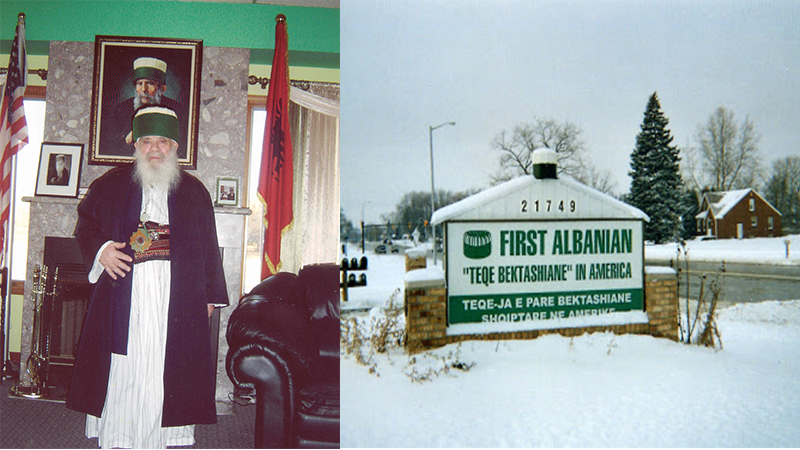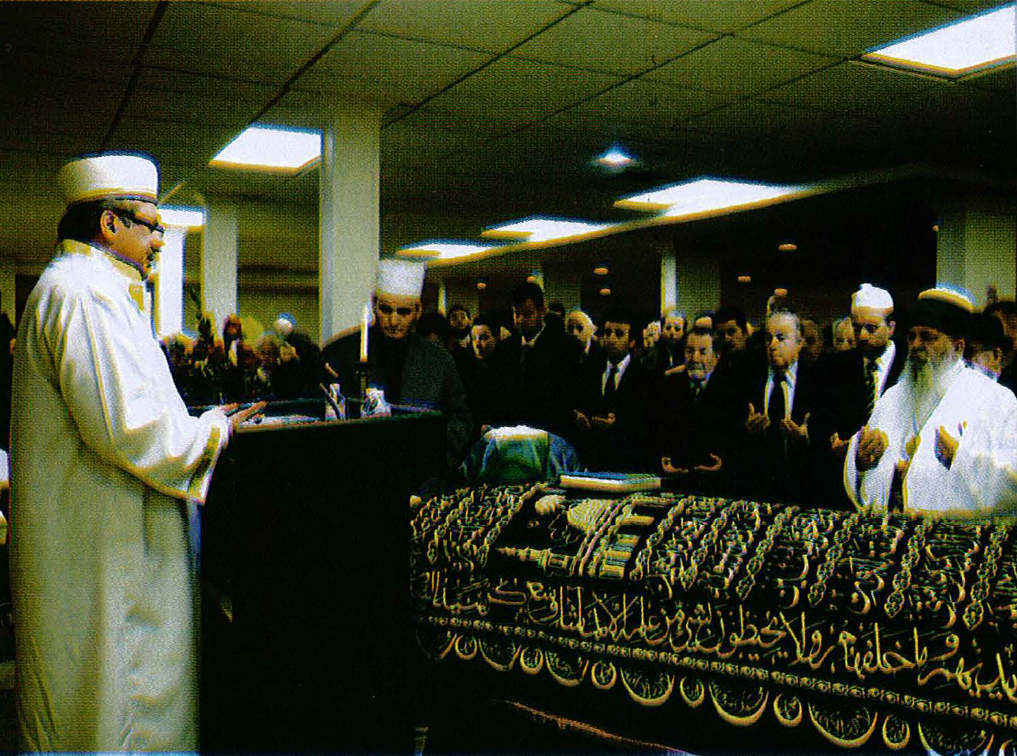
Arshi Bazaj was born in the village of Shkoza in Vlora in 1910. He completed four primary classes in his native village and then his work was on farming. From the age of 7, his parents often took him to the tekke, to The father Bektash Aliaj, where he came in contact and grew up with the Bektashi spirit. When he turns sixteen, he ‘took hand’ as a myhib and continues to work and live in the Golimbas tekke.
In 1926 he was consecrated a dervish by his father Bektash Aliaj and, thanks to Bektashi traditions, undertook a pilgrimage to the Bektashi Pilgrimage of Turkey for several months, while also visiting other Bektashi tekkes. He returned to Golimbas and in particular, in the month of Ashura, he visited famous tekkes such as that of Bllaca in Dibër, that of Shememi-Babai in Kruja, that of the Great Tekke of Elbasan, that of Melçan in Korça and that of father Selimi in Gjirokastra. Exchanges of visits and conversations with the Bektashi fathers and dervishes of that time, were at the same time schools of spiritual travel in this tariqat.
In August 1939, dervish Arshiu, with the blessing of father Bektash Aliaj, joined the nationalist forces led by Hysni Lepenica, in the battles against the Italian occupator, in Vlora Region.
Meanwhile, the increase of the political and military power of the National Liberators was being accompanied by harsh attitudes towards the nationalists such as the dervish Arshi Bazaj. Under the pretext that “he had to give an account to the partisan command of Vlora”, two or three illegal communists knock one evening in the Golimbas tekke. But father Bektash Aliaj refuses to send the dervish there, telling him that everyone, from the partisan command of Vlora, was welcome in the tekke. Two months later, seeing what was happening to many nationalist fighters, father Bektash gave his dervish the blessing and sent him to the Koshtan tekke in Tepelena.
But even in Koshtan, in the summer of 1945, they wanted the dervishes again and this was the reason that together with some other nationalists, he fled to Greece. He stays for almost two years in the refugee camp in Llavrios and then was sent to Italy. In 1953, at the request of the Bektashi tekke of Mukatam in Egypt, he went there and, a year later, it was the Albanian nationalists stationed in the US who took him there.
From 1954 until he closed his eyes in December 2015, Father Arshi Bazaj, was and remained not only loyal to Father Rexhebi (founder of the first Bektashi tekke in Detroid-Michigan), but also the wise cleric, son of Vlora, that spreads peace and love to all generations of Albanians in America.
Bektashi World Grandfather, His Grace,
Haxhi Dede Edmond Brahimaj: Arshi Bazaj,
emblem of purity in our path!
Today is the 5th anniversary of the death of the cleric father Arshi Bazaj, whom we, Bektashis around the world, remember with respect for the contribution he has given. …. There is not the slightest doubt that in the great religious and national role of the Bektashi tekke in Detroit, the life and work of the saint, Father Rexhebi, have been shaped. But within his work, the proverbial wisdom of father Bajram Gjakova, the symmetry of the organization of our rites, by the dervish Lutfi from Egypt, as well as the inexhaustible mental and physical energy of the dervish Arshi Bazaj from Vlora are intertwined in the most harmonious way. This cooperation of Bektashi dervishes and fathers who came from some Albanian regions, is one of the many and very significant examples of the sincere brotherhood that has existed and still exists today, among us, the clergy who have left the warmth of the biological family forever. , to be in the place that belongs to us, in the family of Haxhi Bektash Veliu.
Some time ago, while preparing to travel to the United States of America, as a high religious representative of the Bektashi Holy See, I met with myrshid Haxhi Dede Reshat Bardhi. Before and after each trip, we his spiritual disciples had to talk to him about everything. Headfather Bardhi spoke about the role and place of Father Rexhebi’s tekke in the history of world Bektashism, concluding with this word: “My son! I am sorry that the conditions and time did not allow you to meet father Rexhebi. Though thousands of miles away from us, he has been so close especially in 1967-1990. Despite our concerns about the ban on religion, despite our persecution, and imprisonment, the idea that Haxhi Bektashi’s candle was lit in America has served as an ointment for our wounds.
After Father Rexhep left this temporary world, the tekke continues to keep alive our best traditions. You are very lucky to meet and talk to father Arshi Bazaj, who has put his life completely in the best interest of our way “. With these wonderful words we left for the United States of America and after a visit to the premises of the Congress, in Washington, together with senior representatives of the traditional religious communities of Albania, we addressed our tekke in Detroit. …. During the following years, I really had the great fortune not only to meet him but also to sit in a “vents” as Father Arshiu wanted to say. He spoke to me about the first difficulties in opening the tekke, about the believers who helped with soul and money, about the deep knowledge that Father Rexhebi displayed, about the acceptance at the door of the tekke of every Albanian in distress, regardless of the faith that belonged to him. At first glance, as you listen it seems that the value of these conversations can be known in the historical context. But if you listen carefully, if you have the right Bektashi knowledge, if you know the prophetic hadiths and know their explanation, then you are convinced of the deep river of knowledge of Father Arshi. He who in these conversations, sees only those white streaks of the river that wet the stones of the shores, sadly has not understood any of the great meanings of this saint.
The tekke of father Rexhep, like the Bektashi tekkes all over the world, with the human dimension manifested at all times, with the doctrine of eternal purification of the soul from the mortal things of this world, unites every day more and more new believers in Creators. And not only symbolically but in this so significant battle, father Arshi Bazaj remains, a servant full of spiritual and physical vitality.
Prepared by:
Nuri ÇUNI
Kujtim BORIÇI

